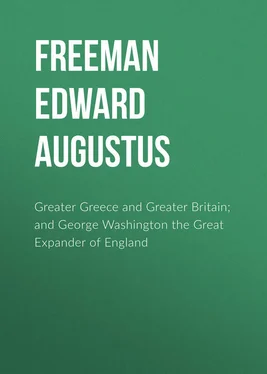Thus the old Greek citizen, in his settlements beyond the sea, founded cities, cities free and independent from the beginning. Let us see now what the modern European colonist, subject of a kingdom, has founded. He has founded settlements of very various kinds in different cases; but he has nowhere founded free and independent cities, like the Greek and the Phœnician before him. Cities indeed in one sense he has founded, vast and mighty cities, busy seats of arts and industry and commerce, but not cities in the elder sense, cities independent from their birth, cities that are born the political equals of the mightiest kingdoms. Cities like these the subject of a kingdom, bound wherever he goes to remain the subject of a kingdom, can never found. But what can be found instead? He cannot, in the nature of things, found kingdoms; it is the essence of his being that he and all that he has should remain part of an existing kingdom. His first act on entering an unknown land is to declare it to be part of the dominions of the prince from whose territories he has set forth. Wherever he goes, whatever he does, he is tied and hampered by the necessity of abiding in the allegiance of his original sovereign. It is wonderful to see how near some of the founders of modern European settlements came to the creation of really independent states. A slender line indeed distinguished the elder colonies of New England from states absolutely independent. The interference of the mother-country was, in many times and places, slight indeed. Still the final step was never taken; they were not absolutely and formally independent states, like the old settlements of Greece and Phœnicia. As all the world knows, even those settlements where local freedom was fullest, those which came most nearly to the level of actual independence, needed a Declaration of Independence, a War of Independence, to raise them to its full level. The settlements of modern Europe have not conformed to the pattern of Syracuse and Massalia; they have followed the exceptional pattern of Korkyra and Kamarina. In Greek Asia then, in Greek Sicily, in the Greater Greece itself on the forked peninsulas of Italy, we see a gathering of Greek settlements, each a free and independent city, each as a free and independent city carrying on its own political life, its questions, its disputes, perhaps its wars, with some fellow city; but all alike Greek, all glorying in the Hellenic name, all looking back to old Hellas as the motherland, each looking to its own mother-city, not with the dread of a subject, not with the helplessness of a child still in tutelage, but with the manly deference of a child of full age, whose reverence for his parent is none the less because he is no longer a member of the household. By way of contrast to that national life abiding in a new land, we see, in vast regions of the American continent, lands which once were English, which once were Spanish, which are still English and Spanish as far as common blood and speech and history can make them so, but which have ceased to be English or Spanish as political communities, and which grudgingly acknowledge the English or Spanish name. We see lands that parted in wrath from the motherland, and by whom the wrath of that parting has not wholly been forgotten. We see lands whose independence, instead of growing from the beginning with the good will of a watchful parent, has been won by the sword from the grasp of a parent who strove to keep her children in subjection. And all this has been the direct and necessary result of the theory of political life which the founders of those English and Spanish settlements carried with them. Subjects of a kingdom could do no otherwise; the theory of an allegiance which could never be cast aside obliged their settlements to become provinces, dependencies, whatever name is chosen, of the motherland. They could not found an independent kingdom any more than they could found an independent city. Dependence, tighter or slacker, was the necessity of the case. But it was no less in the necessity of the case that a day should come when even the slackest form of dependence could be borne no longer. That these colonies “are and ought to be free and independent states” was a voice which could not fail to be heard some day in Massachusetts and Virginia; there was no need for it ever to be heard in Syracuse or in Sybaris; for no man doubted their freedom and independence from the day of their first founding.
Конец ознакомительного фрагмента.
Текст предоставлен ООО «ЛитРес».
Прочитайте эту книгу целиком, купив полную легальную версию на ЛитРес.
Безопасно оплатить книгу можно банковской картой Visa, MasterCard, Maestro, со счета мобильного телефона, с платежного терминала, в салоне МТС или Связной, через PayPal, WebMoney, Яндекс.Деньги, QIWI Кошелек, бонусными картами или другим удобным Вам способом.
While I am revising my proofs, I read, in a law report in an English newspaper, something about “an American subject.”












